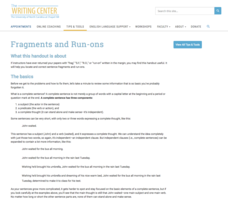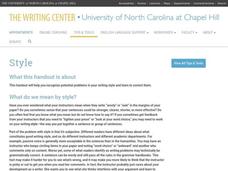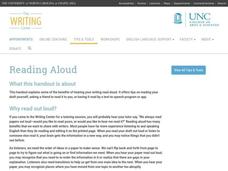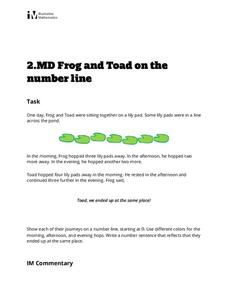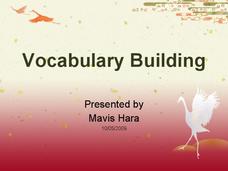K20 LEARN
Who's Coming To Dinner? Descriptive Writing
"The Dinner Party" is the anchor text in a lesson designed to encourage writers to use sensory details in their stories. After brainstorming descriptive words and phrases for the five senses, class members read Mona Gardner's...
Smekens Education Solutions, Inc.
Introducing the 6 Traits to Students
Put together an English language arts unit on the six traits of writing with this helpful collection of resources. From fun songs to differentiated writing exercises reinforcing each of the traits, great ideas are provided for...
University of North Carolina
Fragments and Run-ons
English teachers around the world cringe when they come across fragments and run-ons in papers. A handout on these poor imitations of sentences helps bring relief by reviewing the basics of sentence construction and by offering...
Curated OER
Phrases and Clauses
Clarify the different types of phrases and clauses that young writers can use to vary their sentence structure. A helpful slideshow presentation encourages your class to fix sentences by adding more interesting phrases and clauses,...
University of North Carolina
Style
Just like you choose your clothes to ensure they fit the occasion, you should choose your words deliberately while writing. Style, the main topic of one handout in a series on writing skills, involves choosing words carefully and paying...
University of North Carolina
Verb Tenses
Twelve categories of verbs exist in the future tense, ranging from simple present to future perfect progressive, but only three have a place in academic writing. Those three tenses make up the content of an informational handout that...
Core Knowledge Foundation
Kindergarten Skills Unit 1
A unit focuses on prewriting skills. Over 10 days, young scholars practice drawing lines and shapes, use play dough to build shapes, and track from left to right. Pupils put their sense of hearing to the test by listening for words...
University of North Carolina
Reading Aloud
Warning: reading your paper aloud may cause bystanders to think you're talking to yourself. However, as the 14th installment of 24 in the Writing the Paper series from UNC explains, it is one of the best strategies for revision. Through...
BW Walch
Creating Linear Equations in One Variable
The example of two travelers meeting somewhere along the road has been a stereotypical joke about algebra as long as algebra has existed. Here in this detailed presentation, this old trope gets a careful and approachable treatment....
Lesson Plansos
Guided Reading Activities with Pizzazz
Get the most out of your guided reading lessons with this collection of literacy materials. Offering a system for using color-coded tags to mark pages while reading books, as well as an assortment of comprehension and grammar...
Curated OER
How Do Adjectives Improve Writing?
Using adjectives to create vivid descriptions is the focus of exercises in this resource. A cloze reading activity asks class members to add missing adjectives to passages from Mark Teague's The Lost and Found. They then read...
Illustrative Mathematics
Frog and Toad on the Number Line
Administer a learning activity that challenges your class to use a number line in the form of lily pads. Learners are instructed to display the number of hops that Toad and Frog take during their journey on a number line. Young...
University of North Carolina
Relative Clauses
Knock, knock. Who's there? To. To who? No! To whom. Knowing when to use who versus whom is just one of the many topics covered on a handout about relative pronouns. Writers discover how to incorporate words such as whose, that, which,...
Southern Nevada Regional Professional Development Program
Common Core Reading Standards: Understanding Argument
What does your class know about logical fallacies? They can find out quite a bit and practice identifying logical fallacies if you follow the steps and use the resources provided here! After reviewing ethos, pathos, and logos, ask small...
Springfield Public Schools District 186
Form and Structure of Poetry
If anyone suffers from metrophobia—the fear of poetry—the PowerPoint on the elements of poetry may help alleviate their worries. The presentation introduces learners to poetic elements, including simile, metaphor, and personification....
Curated OER
Negative Words & Expressions in Spanish
You don't never use double negatives in English, but the grammar is slightly different in Spanish. Help your class grasp this concepts and pick up how to compose sentences that are negative, rather than affirmative with the information...
Southern Nevada Regional Professional Development Program
Focus: Spelling Common Words
If you’re going to get a tattoo, make sure your artist writes it right because it’s hard to correct their inkings. That’s the big idea in this short lesson on commonly misspelled words like their/there/they’re and it’s/its. Images...
Teach Your Children Well
Spinning a Web
Lisa Trumbauer's big book, Spinning a Web, provides kids with an opportunity to practice word sequencing, to use correct punctuation, and to develop comprehension skills with a cloze reading evercise.
Curated OER
Vocabulary Building
Offer learners a step-by-step process for approaching unknown words with this PowerPoint presentation of vocabulary strategies, which details how to use context clues and word parts (roots, prefixes, suffixes), as well as encourages...
West Contra Costa Unified School District
Matching Quadratic Functions
Ever sigh when learners ask why they have to know so many different forms of the quadratic equation? Here is a lesson that comes in handy! Using hands-on matching activities, quadratic equations are explored through...


